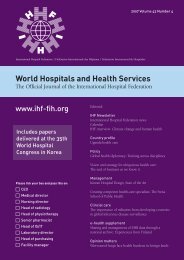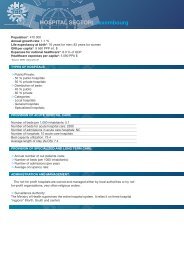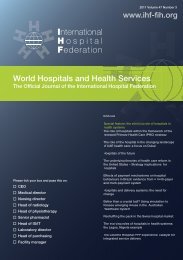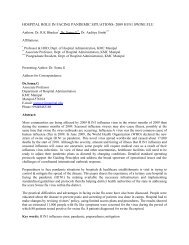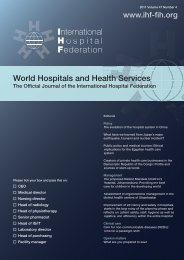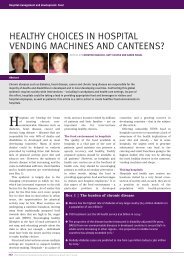World Hospitals and Health Services - International Hospital ...
World Hospitals and Health Services - International Hospital ...
World Hospitals and Health Services - International Hospital ...
Create successful ePaper yourself
Turn your PDF publications into a flip-book with our unique Google optimized e-Paper software.
POLICY: EUROPEAN DEVELOPMENT<br />
adopted this model. In these countries, the regional health<br />
authorities contracts with – usually public – hospitals <strong>and</strong><br />
health centres.<br />
In Germany, corresponding elements are being gradually<br />
introduced. There is more freedom for contracts between<br />
individual – public – health insurancs <strong>and</strong> particular service<br />
providers or even between groups.<br />
As service providers are unable to reverse theis trend<br />
towards the purchasing model, the likely consequence is the<br />
emergence of greater competition between established<br />
physicians <strong>and</strong> hospitals, between health insurance<br />
companies <strong>and</strong> between hospitals themselves. They all have<br />
to face the competition <strong>and</strong> try to get the best out of it for<br />
themselves <strong>and</strong> their patients.<br />
More competition by integrated supply <strong>and</strong><br />
structured treatment programmes<br />
This constant increase in competition has been<br />
accompanied by a further trend in some European<br />
countries, for example in the United Kingdom <strong>and</strong> Austria,<br />
that is the development of integrated supplying forms <strong>and</strong><br />
structured treatment programmes.<br />
The rationale for this is the optimum provision of service<br />
to patients is often obstructed by a lack of cohesion <strong>and</strong> by<br />
unsatisfactory co-operation of the different service<br />
providers. The resultant outcome is one of failed delivery<br />
service to the individual patient <strong>and</strong> failings in the health<br />
system. There is therfore on the one h<strong>and</strong>, expensive<br />
multiple investigations, <strong>and</strong> on the other h<strong>and</strong>,<br />
informational deficits <strong>and</strong> interrupted treatment chains.<br />
In Germany, these problems are significantly pronounced,<br />
one reason being the existence of the policy of strict<br />
separation of various health sectors. For many decades,<br />
politicians have tried to find solutions; usually, they failed<br />
because of a lack of courage <strong>and</strong> strength of will; the system<br />
thus has remained unhanged, <strong>and</strong> has instead became even<br />
further entrenched. The law of GSG about the out-patient<br />
surgery in 1993 brought a new hope <strong>and</strong> perspective. The<br />
new GMG of 2003 could start a significant further<br />
development into that direction.<br />
For the ‘integrated supply’, special financial resources<br />
were founded, which will increase the incentive of health<br />
insurance companies <strong>and</strong> service companies to offer more<br />
appropriate contracts. However, one must be aware that the<br />
financial resources (additional money) will not be used for<br />
the recent health-system. Any Euro that is spent for the<br />
system will be removed from the service providers budget<br />
before, particularly from the hospitals budget.<br />
More competition by opening hospitals<br />
In the context of current developments, one has to regard<br />
the increasing tendency of hospitals towards the supply of<br />
patients with out-patient treatment.<br />
Once again, we should investigate the German system:<br />
Not because the German system is a representative model,<br />
but because it clearly shows what was going wrong. It has<br />
not been allowed for German hospitals to offer out-patient<br />
treatment to normal patients. With the current health<br />
reform, this will improve in a few matters of detail. The full<br />
supply of the patients will increase, but only in hospitals<br />
that offer appropriate contracts to health insurance<br />
companies or that found new ‘supplying centres’.<br />
These trends are quite important for hospitals. <strong><strong>Hospital</strong>s</strong><br />
are nearly perfect for any organisation of integrated supply<br />
<strong>and</strong> integrated production; they also maintain strong<br />
management capacities, experts <strong>and</strong> interdisciplinary teams,<br />
<strong>and</strong> at least, they have an advantage in quality assurance<br />
compared to established physicians. Therefore, hospitals<br />
should participate actively in the development of integrated<br />
supplying forms, <strong>and</strong> they should enlarge the range of their<br />
out-patient treatments.<br />
More competition by defined lump sums for<br />
medical treatments<br />
The transition from daily rates to lump sums with respect to<br />
hospital remuneration has to be judged as an as innovative<br />
as daring contribution to the reinforcement of the<br />
competition thought. A recently published trade-off study<br />
by DKG (German <strong>Hospital</strong> Association) shows that the DRG<br />
system (medical lump sum system), is becoming more <strong>and</strong><br />
more important in the whole of Europe. With exception of<br />
Luxembourg, every country in Europe is using the system of<br />
the DRG, for instance for benchmarking, for quality<br />
assurance, for the calculation or distribution of budgets or,<br />
however, – as in Germany – for remuneration of any<br />
individual case of treatment.<br />
Great Britain decided to change over to a medical lump<br />
sum system until 2008. Obviously, the ‘German system’ was<br />
taken as a model for Great Britain, because the British want<br />
to include all in-patient treatments <strong>and</strong> obviously intend to<br />
start a country-wide fixed price system for the DRGs.<br />
Besides that, some of the new European countries have<br />
experiences with the DRG system, too. For instance,<br />
Hungary already has used DRGs for more than 10 years,<br />
while Tschechia <strong>and</strong> Romania have just started to introduce<br />
the lump sums.<br />
Development of quality st<strong>and</strong>ards<br />
The pressure to ensure better medical <strong>and</strong> nursing quality<br />
will continue to increase, although the financial budgets<br />
will remain scarce. A current report by the European<br />
Union Commission shows that this topic is located at the<br />
top of the political agenda in most EU member states. In<br />
the last years, nearly every country achieved progress<br />
regarding the development of quality st<strong>and</strong>ards in the health<br />
service. According to the EU report, the in-patient sector<br />
leads the way in this respect. In contrast to that, the outpatient<br />
sector still has substantial implementation problems,<br />
even with regard to questions of structure quality, which<br />
could be measured <strong>and</strong> improved quite easily.<br />
In contrast to this, there is still a larger pent-up dem<strong>and</strong><br />
for all supply areas with respect to the quality of process <strong>and</strong><br />
result. <strong><strong>Hospital</strong>s</strong> should take the leading role within this<br />
movement, too. The call for public, measurable criteria for a<br />
high-quality achievement becomes louder <strong>and</strong> louder.<br />
Medical progress that one can afford<br />
16 | <strong>World</strong> <strong><strong>Hospital</strong>s</strong> <strong>and</strong> <strong>Health</strong> <strong>Services</strong> | Vol. 40 No. 4



